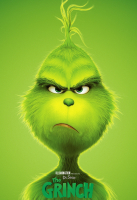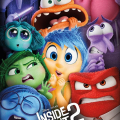The Grinch
Review
From the moment the twirling snowflakes danced across the screen, I knew I was in for a visual feast. This time around, the beloved tale of the Grinch—an iconic story entrenched in our collective holiday consciousness—had been given fresh life in a vibrant, animated format.
The Grinch
The Grinch's foray into cinematic animation once again, with the 2018 release, was an invitation to revisit Whoville in a delightfully surreal exploration.
Dr. Seuss's "How the Grinch Stole Christmas!" has transcended generations since its inception, becoming much more than a seasonal story. The original narrative was a biting commentary on the commercialism that obscured the true spirit of Christmas. While adaptations have varied in style and storytelling, the latest animated rendition manages to capture both the whimsy and the weight of Seuss's intentions with an artful grace.
Benedict Cumberbatch voices the Grinch, bringing layers of complexity to this green, furry grouch. His American accent is both amusing and endearing, adding a contemporary twist to the character. Unlike its predecessors, this adaptation digs a bit deeper into the Grinch's past, providing a rationale behind his disdain for the festive season, much like Charles Dickens' Scrooge.
As we are introduced to the Grinch's world, perched atop the mountains overlooking Whoville, there's an immediate realization: he wasn't always this way. Flashbacks reveal a young Grinch growing up without love in an orphanage. It's a backstory that, while possibly superfluous to staunch purists, offers layers to his character, allowing audiences to understand the ice encasing his heart.
Visually, the film is a playful ode to the universe imagined by Dr. Seuss—an amalgam of surreal curves and bends brought to life with exuberant colors. Whoville is depicted as a sprawling, gingerbread-esque town, each window and lamp post tailored to embody the Yuletide spirit. In stark contrast, the Grinch's lair is barren, a haunting reminder of his solitude and withdrawal from joy.
The dynamic between the Grinch and his loyal dog, Max, adds warmth and humor to the narrative. Max, with his earnest antics and unwavering support, is a character that epitomizes loyalty. Together, their interactions unfold like a comedic duo, occasionally punctuating the narrative with levity, whether through a frothy latte face or a series of 'mood' outfits as unchanging as the Grinch's expression.
This version of "The Grinch" intertwines two parallel plots. On one hand, you have the Grinch plotting to ruin Christmas by swiping Whoville's decorations and gifts—a mission driven by bitterness. On the other hand, there's Cindy Lou Who, portrayed with charming innocence by Cameron Seely, scheming to meet Santa with a selfless wish in her heart—to ease the burdens of her single, diligent mother, played by Rashida Jones.
Watching their stories unfold, I was particularly taken by the film's commentary on community and kindness. In a world as commercialized as Whoville, seeing the Grinch's internal battle unfold is a reflection of our own struggles against the pressures to conform to materialism, a poignant reminder of the values that should prevail during the holiday season.
The Grinch's caper is inventive, employing a series of fantastical gadgets to execute his mischievous plan. There's humor throughout—like his bloated reindeer, Fred, who is as endearing as he is ungainly. These touches, while seemingly trivial, punctuate the story's progression with delightful comedy, keeping the audience engaged as the plot unfolds.
One can't ignore the auditory landscape of the film either. The musical composition, led by Danny Elfman, is a symphony of whimsy and nostalgia, integrating classics with fresh interpretations. Tyler the Creator’s lively rendition of “You’re a Mean One, Mr. Grinch” showcases the character's sardonic essence, while Pharrell Williams, as the narrator, conveys Dr. Seuss's rhymes with rhythmic precision.
Among the film's standout moments is when the Grinch ventures into Whoville for supplies. It’s here that Benedict Cumberbatch's vocal talents shine, the blend of irritability and concealed delight in the Grinch's demeanor offering a comedic yet touching portrayal of a character struggling with isolation and begrudged sentiments.
For me, the film's success lies not just in its adherence to the original story but in its willingness to adapt and expand on the narrative. While purists might argue that not all of the backstory is necessary, it adds emotional depth to the Grinch’s eventual transformation. His journey from disdain to acceptance is a heartening reminder that change, however begrudging, is possible.
The sequences of the Grinch and Cindy Lou each devising their Christmas Eve plans to pivot the narrative with clever juxtaposition, illustrating Seuss's deft hand at portraying subjects as universally relatable.
I appreciated the film's commitment to depicting the Grinch's climax in character—a moment when his motives unravel, ending in an impromptu invitation to share a holiday meal. It’s a moment that resonates with warmth as the gathered Whos offer the Grinch not just a meal but acceptance, softening his cynical view of the world.
The Grinch's transition feels organic, neither rushed nor forced. His longing for connection and acceptance shines through, inviting viewers to reflect on their own relationships during the festival of joy and sharing. The humanity injected into his character is an inspiring touch, encouraging us to shed preconceived notions and embrace generosity and kindness.
Moreover, the film succeeds in retaining the story's core message without shying away from theatrical spectacle. It's a visual and auditory journey that doesn't overwhelm but rather complements and elevates the storytelling process. The imaginative elements, from Grinch’s sleigh to his intricate plotting mechanisms, are artfully executed to make the film an entertaining and fulfilling experience.
Indeed, in the world of adaptations, this rendering of "The Grinch" stands tall, not just as seasonal entertainment but as a meaningful exploration of transformation, empathy, and the holiday spirit. With its vibrant animation and effective storytelling, it might just find a spot as a treasured tradition for families revisiting this tale of redemption and joy year after year.
As I left the screening, I couldn't help feeling that this iteration of The Grinch had succeeded in something special. It captured the evolving spirit of Christmas, blending humor, emotion, and spectacle into a delightful tapestry that celebrates both the book's origins and the spirit of adaptation.
In Conclusion
While no version can completely replicate the magic of Dr. Seuss's original text or surpass the enchantment of a tale read aloud by a loved one, the 2018 animated "The Grinch" certainly makes a mark of its own. It's a film tailor-made not just for children but for anyone looking to rekindle the festive spirit through humor, vivid storytelling, and a much-needed reminder of the true essence of Christmas—kindness, compassion, and togetherness.

















Leave a comment
Your comment is awaiting moderation. We save your draft here
0 Comments